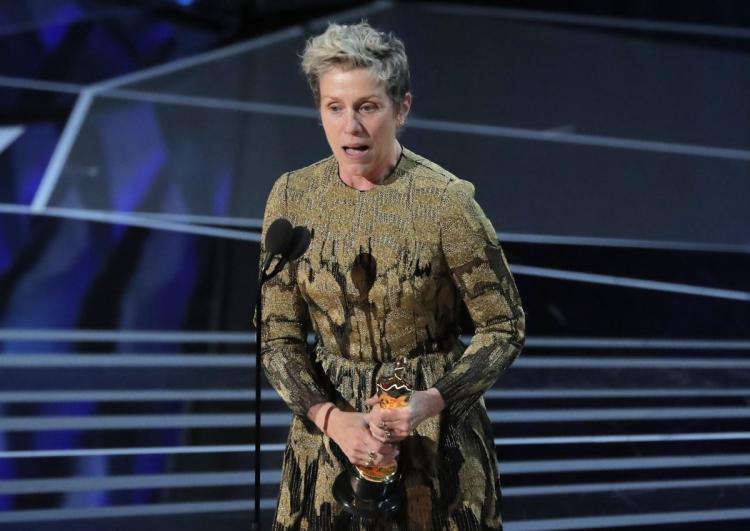As the first Oscars since the incubation of the #MeToo and #TimesUp movements, the award show on Sunday, March 4, was bound to witness several moments that dealt with the issues of sexual harassment and workplace inequality.
Host Jimmy Kimmel took it upon himself to steer the night and audience into these two topics in his opening monologue, but it was Oscar winner France McDormand who really got people’s attention with her two big words: inclusion rider.
Winner of two Academy Awards, including best actress for her role in this year’s “Three Billboards Outside Ebbing, Missouri,” McDormand stole the Oscars stage when she accepted her award for the role of Mildred Hayes, a grieving and fierce mother who demanded action from local police for her daughter’s murder and wasn’t taking lack of answers as an answer.
The win for this role feels particularly relevant to this moment in women’s history. In trying to get justice for her and her daughter, Hayes used three billboards to get a message to those who are supposed to be serving the victims. The performance appears to resonate with many during a year when women have created cultural waves across industries by speaking out and demanding changes.
Since the film’s release, many activists have used the protest tactic that McDormand’s character used to call out people in power, including students and families affected by the Portland school shooting recently. Instead of billboards, the protesters decided to use three trucks to speak out on gun control.
McDormand was joyous and surprised about her win. The first words of her acceptance speech were about how she could possibly start hyperventilating and if she fell over she was to be picked back up, “because [she had] got some things to say.” And you bet she did say them.
https://www.youtube.com/watch?v=-86vgvZGMs4
McDormand started off by thanking the writer and director of “Three Billboards,” Martin McDonagh, her sister and several others. Moments after picking up her statuette from the presenters, she set the golden figurine down to the side of her for “perspective,” patting it on its head quickly.
The actress then spoke to the women sitting in the audience, asking all nominated women to stand up and accept the award alongside her, regardless of whether their work was in front of or behind the camera. She wanted all “the filmmakers, the producers, the directors, the writers, the cinematographers, the composers, the songwriters, the designers” to be honored.
After the women stood in the audience, McDormand turned her attention back to the gatekeepers of the film industry, particularly the male gatekeepers as she said to “look around you, because we all have stories to tell, and projects we need financing.”
She continued to say that she and many other women would be more than happy to tell them about it if they’d stop by their offices. McDormand clearly wanted to shed some light on the Hollywood scene and the idea that women want and can and should be increasingly more prominent around the camera.
McDormand wrapped up her speech by saying, “I have two words to leave with you tonight, ladies and gentlemen: inclusion rider.”
These two words may seem simple, but when Frances McDormand concluded her acceptance speech at the Academy Awards with them, there was a small hesitation before the audience clapped. Before this moment, not too many in or out of the academy had heard those words paired together.
However, those little words made a big splash online. A large spike in Google searches for the phrase on Sunday night reflects the plethora of people around the world who inquired about the actress’ phrase.
Merriam Webster too had an increase in traffic, tweeting out that “inclusion,” “rider” and “feminism” took the top searches and hashtagged the Oscars as the reason for that peak.
So what does “inclusion rider” actually mean? In simplest terms, it’s the requirement that actors and actresses can have a section inserted into their contract that demands a certain level of gender equality and racial diversity among a film’s cast and crew.
The term was first coined by social scientists Dr. Stacy Smith with civil rights and employment practice lawyer Kalpana Kotagal.
Smith used the idea in 2014 for a column for the Hollywood Reporter where “equity rider” was described and leaned on A-lister actors and actresses, hoping that they would add a clause into their contract that would make sure that “tertiary speaking characters should match the gender distribution of the setting for the film, as long as it’s sensible for the plot.”
All in all, the clause would make sure that not only are all races represented equally on all fronts but they are also represented correctly. Smith activated this phrase with the hopes that every actor and actress would place it within their contract, creating a film industry that has no choice but to be a place of evenhandedness.
McDormand was more than willing to stand up next to the phrase and relay it to the audience of actors, actress and filmmakers. ”I just found out about this last week,” she told reporters after the ceremony, referring to the inclusion rider concept. “And so, the fact that I just learned that after 35 years of being in the film business — we’re not going back.”
Several other actresses agreed with her. After the Oscar ceremony, the idea of an inclusion rider began popping up around many well-known names, including comedian Whitney Cummings, who tweeted out, “we should support this for a billion reasons, but if you can’t find a reason to, here’s one: it will make movies better.”
“Captain Marvel’s” star Brie Larson also took to Twitter in support of McDormand, “I’m committed to the Inclusion Rider. Who’s with me?” and already co-signed the idea of an inclusion rider.
“It’s something we didn’t know we could demand,” three-time Oscar winner Meryl Streep said on McDormand’s mention, “it’s because girls ask for permission but now, we are just bursting.”
Regardless of anything that took place at the Academy Awards, McDormand took the opportunity she was given to speak out on an idea that not many knew of that she thought everyone should.
Her win wasn’t to spotlight her accomplishments, but the accomplishments of every woman within the business in the hopes that there will be many more of them in the future to hold that golden statue.









